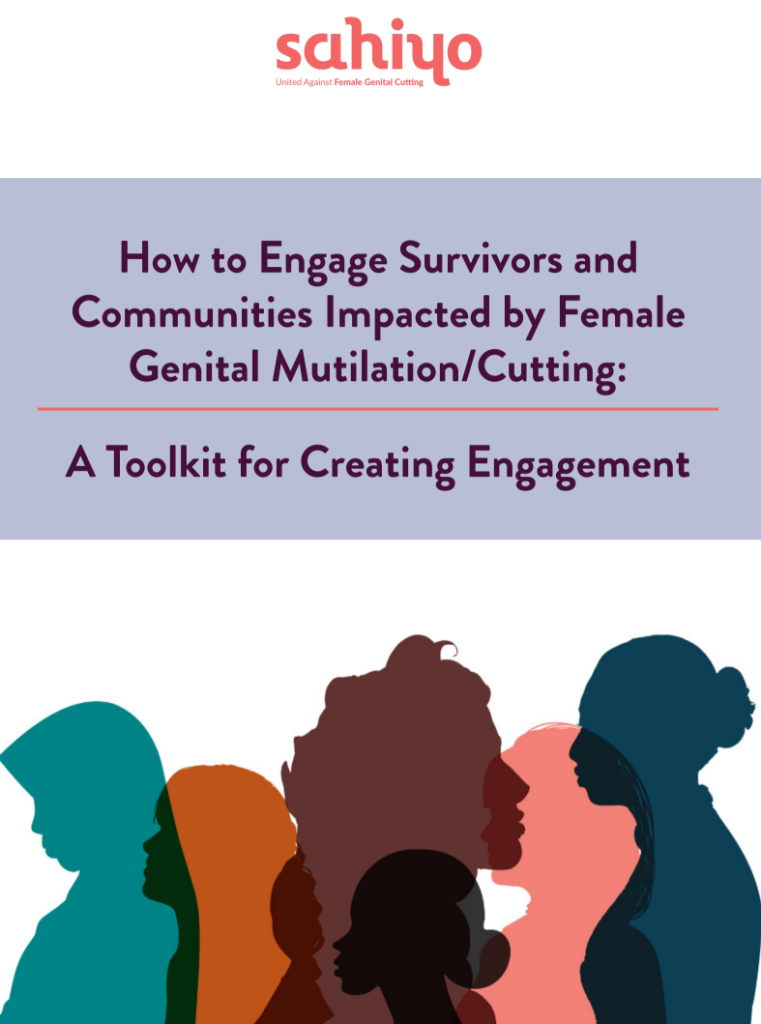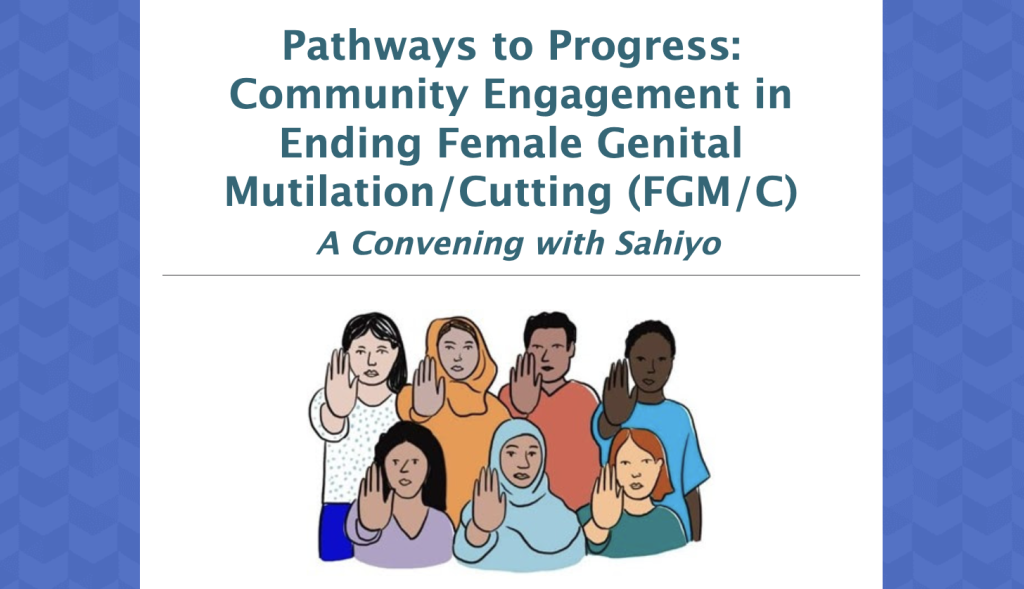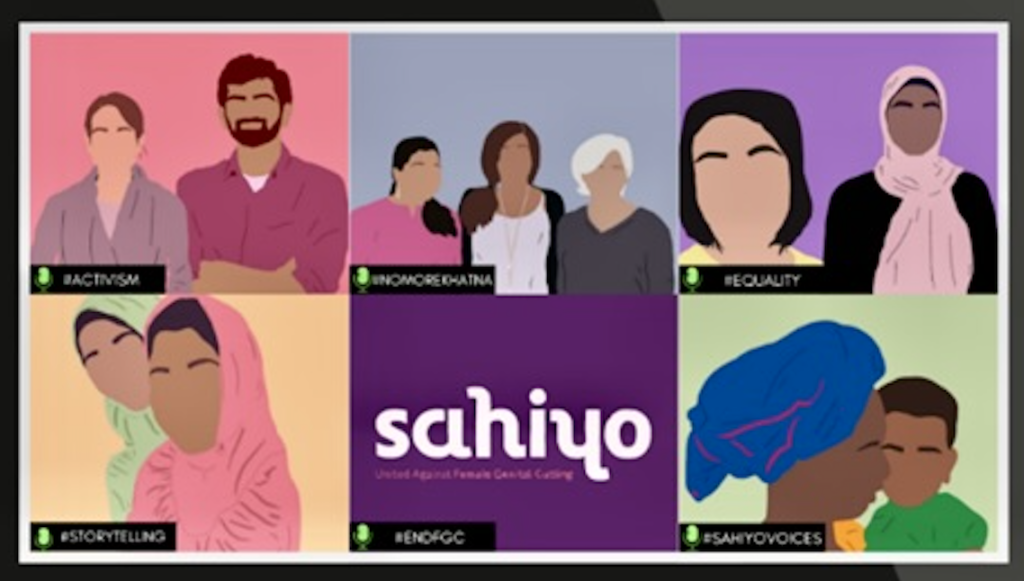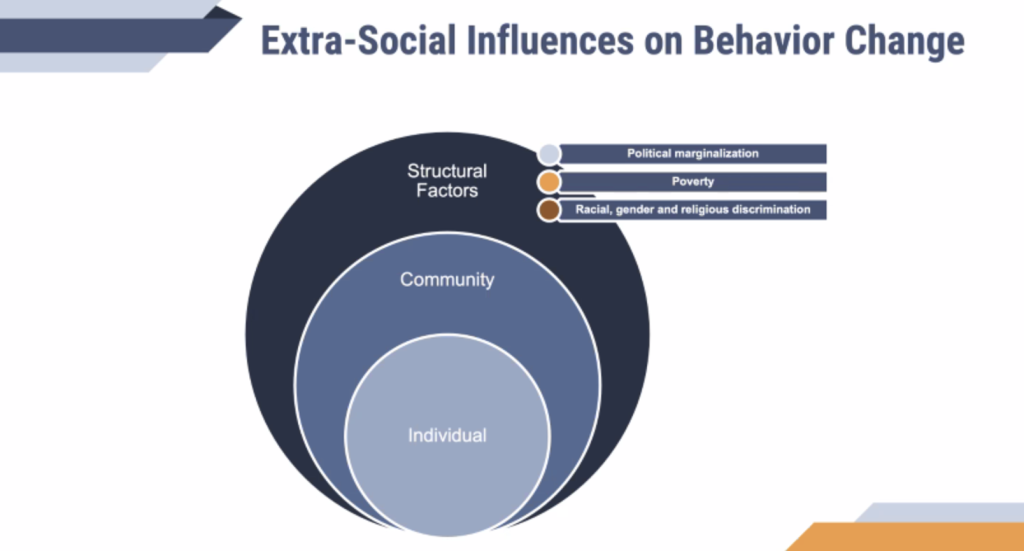Newly Released: Sahiyo’s Toolkit on Survivor and Community Engagement!

Here at Sahiyo, we believe that every individual and community impacted by female genital mutilation/cutting (FGM/C) deserves to be heard, supported, and empowered. That’s why we’ve created the How to Engage Survivors & Communities Impacted by Female Genital Mutilation/Cutting (FGM/C): A Toolkit for Creating Engagement (or Survivor & Community Engagement Toolkit, for short). A resource built for those on the front lines of prevention efforts, survivor advocacy, and community outreach. FGM/C is a deeply complex and culturally sensitive issue, which makes engaging with impacted communities challenging, but essential. This toolkit provides practical guidance and best practices for outreach, education, and support. It’s not just a collection of strategies; it is a product of lessons learned from real-world efforts across the U.S., gathered throughout 2023-2024 from grassroots organizations who have been working tirelessly to support survivors and prevent the practice of FGM/C. Why Survivor and Community Engagement Matters In the movement to end FGM/C and support those impacted by it,, engagement is key to progress. In our experience, and based on the insights shared with us from other organizations, we recognize that it’s not enough to just raise awareness—we need to connect, listen, and build trust with the communities impacted by FGM/C to fully engage on the topic. But what does “engagement” truly mean in this context? Engagement means showing up—not just as advocates or professionals, but as compassionate listeners, who seek to understand and not just respond. It is about actively connecting with and fostering understanding among a diverse group of individuals, including those who have experienced FGM/C, their families, friends, and even those who have not been directly impacted by FGM/C. Meaningful engagement creates spaces where survivors feel safe to share their stories, where their experiences are valued, and where they can contribute to solutions. It’s about bringing everyone into the conversation- men, adolescents, community leaders, elders, religious figures, teachers, and other local officials. The more voices we bring to the table, the stronger we become as a movement! “Unless you are engaged with the community, it’s very very hard to recruit women. They are culturally very sensitive. And they really don’t want to talk about it, about FGM/C, the harmful practice they have been through. For example, I am the impacted, the victim of FGM/C, I have the same experience as them and they feel comfortable to talk to me about it. They don’t trust you by the title, they trust you if you build a relationship with the community.” – Rufo Jiru, Anolee Sisters *This toolkit was completed on September 30, 2024. What’s Inside This Toolkit? We know that every community is unique, and we also know that addressing FGM/C requires multiple approaches that respect and reflect those differences within impacted communties. The toolkit is organized into sections that take you step-by-step, identifying the best ways to engage, support, and collaborate with the communities you serve. Here’s a glimpse of what’s inside: Survivor and Community Engagement – An Overview: Gain a holistic understanding of community and survivor engagement. Reviewing why it is important and how it makes a difference. Ethical and Cultural Considerations: Learn how to approach FGM/C with respect and cultural sensitivity. This section provides guidance to ensure mindful interactions. Strategies to Conduct Survivor & Community Engagement: Discover different methods to connect with and support individuals and communities impacted by FGM/C. Review case studies in which organizations share their experiences with community engagement and lessons learned. Decision-Making in Program and Event Planning: Understand that every community is unique. Learn ways to adapt various forms of engagement to suit the specific needs and contexts of each community. “Community engagement is very important because a lot of our clients face a lot of barriers to getting services. So creating those outreach and educational community events that we do in different apartment complexes here in Columbus, where most of our refugee and immigrant clients live, provides an opportunity for us to be in the neighborhoods, be where our clients live, and help introduce them to the different services that we have at US Together.” – Hana Adelbaki, US Together Who Contributed? This toolkit is a collaborative effort, drawing on insights from individuals affiliated with organizations working in the field of FGM/C prevention and advocacy. Their experiences provide valuable perspectives on addressing FGM/C across the United States. Insights are gleaned from the following organizations: African Cultural Alliance of North America (ACANA) African Family Health Organization (AFAHO) Anolee Sisters International Institute of Minnesota (IIM) International Survivors And Family Empowered (iSafe) Global Woman Peace Foundation (GWPF) Sahiyo Sauti Yetu Center for African Women, Inc. Nile Sisters Development Initiative (NSDI) The U.S. End FGM/C Network US Together Inc. Silence Speaks Their work, insights, and dedication make this toolkit what it is today—a resource created by the community, for the community.
Pathways to Progress: Community Engagement in Ending Female Genital Cutting

Date: March 18, 2024 Time: 9AM-10:30AM Pacific/ 12PM-1:30PM Eastern Register here: https://bit.ly/RTIxSahiyo. On March 18, Sahiyo and other FGM/C advocates will discuss the pivotal role community engagement plays in raising awareness of FGM/C and ultimately ending the practice. Led by Sahiyo’s U.S. Executive Director Mariya Taher, panelists will share effective ways to engage with FGM/C impacted communities. We invite everybody to attend the virtual panel discussion! Speakers will include: Wonder Guannu, who is the African Cultural Alliance of North America’s Project Coordinator for the FGM/C Project in Philadelphia Samman Masud, who is Sahiyo’s Community Engagement Coordinator Breanne Lash, who is the Director of Programs for Nile Sisters Development Initiative in Los Angeles and San Diego Who should attend this virtual event? Anybody who wants to increase engagement with individuals and communities impacted by FGM/C. What will the event be about? Panelists will share diverse case studies, illustrating real-world examples of community engagement in this field. These discussions will dive into the intricacies of building partnerships, mobilizing resources, influencing systems, and sustaining community and individual-level involvement to improve the wellbeing of those affected by FGM/C. Attendees will: Gain valuable insights into the challenges and successes of initiatives to address FGM/C Learn and be inspired by the power of community engagement in creating impact Gain knowledge about specific strategies Have the opportunity to discuss any workshop approaches that they have used in their communities Register for the event here: https://bit.ly/RTIxSahiyo. After registering, you will receive a confirmation email containing information about joining the meeting. PS: Sahiyo’s Silent Auction fundraising event kicks off on March 6-10 while the Live Virtual Comedy Show will take place on March 7. We aim to raise $15,000 in support of our work. Click here to donate auction items, money, or sponsor the event.
Activists Retreat Reflection: A shift that was needed

By Amena Ali This was my second time participating in the Activists Retreat, and my first Retreat on the planning committee. I thoroughly enjoyed this year, and especially the shift from last year compared to this year. Last year was very focused on people relating to each other in sympathy, and this year it was more about being able to release anger and your anger being validated. I think that shift is really nice to see, because it also portrays how far people have come, in regards to their process for coping, for accepting, and fighting against this. I was really lucky to be a part of that, and I hope in the future, we’re able to do this in person! Read Amena’s reflection on participating in the 2021 Activists Retreat here. Read the report on this year’s Activists Retreat.
Survivors of Childhood Sexual Abuse Belong in the Movement to End FGC

By Anonymous I am a survivor of childhood sexual abuse. Though for much of my life, “victim” felt like the most honest word. Those experiences have shaped my relationships, both to others and with myself, so that forging an identity outside of that trauma is an impossibility. What happened to me exists in public court records and it is known within and outside of my community; it is the thing we don’t talk about at family dinners. So, when I thought of myself, what it meant to be me, “victim” was always near the top of that list. Despite years of therapy, some things are still very hard for me. Some days I am driven by a nameless panic, shaking hands and speeding thoughts and all. Others are much worse than that. A patient, well-deep sadness that I don’t think I will ever be entirely free of. My body often feels like a thing separate from me, such dissociation is not uncommon. The complexity of mental health is never lost on survivors; some days are bad, others are calm and joyful. That’s the journey, and this is a thing I carry. It’s heavy, but I do. When I found Sahiyo, I knew immediately that this was an organization I wanted to be a part of. I knew it would be healing but as any survivor knows, healing can be painful, too. I knew it would challenge me, force me to examine deeply uncomfortable truths. This was an opportunity to observe where my hesitations were coming from. I wanted to become comfortable talking about women’s bodies, about trauma, about health and wellness—all of the things we so gladly tuck away. So in those early days, that’s all I did. I read Maasi blogs, which handled trauma with grace, patience, and accessible resources. I (safely and mindfully) pushed myself to really look at the language and how it was being used. I focused on my body’s responses as I read words I would normally avoid: cutting, labia, orgasm, vagina, genitals, clitoris, consent. I read the stories of survivors, and I held space for their pain, grief, anguish, and their bravery. Over time I realized that so much of their narratives mirrored my own experience. Like them, I knew as a child that something had happened to me. I knew that I was one person before those experiences, and another afterward. Even as a child, I knew that my body now carried the weight of trauma. But like some survivors of female genital cutting, I would reach for the memories and come up with nothing but flashes of pain. Mostly empty air. Whether my mind was protecting itself, or those memories never formed due to particular details of the events, I don’t really know. My body remembers even when my mind can’t. When I was in my early twenties and in a good mental space, I started asking about it. Family, community members who might have insight into the social atmosphere at the time, reporters, the judge who presided over the case. I looked over the court records for the first time. I learned about what had happened to me, what had really happened to me, through the stories of others. There are no words for what an odd, alien experience that was: to ask other people the details about one of the most intimate, traumatic, and developmentally defining experiences of my life. In all of my years of therapy and trauma research, I had never encountered other survivors who had to look outside of themselves, and to their community, to find the answers. Not until Sahiyo. As I read their stories I found words for my own experience. I was able to so strongly identify with their grief and anguish that it felt like a physical tug in my chest. For every hour I spent wondering who I could’ve been without the weight of this sadness, someone else was working through that same struggle. And they were so brave and courageous, talking about their trauma with community members and advocating for childhood consent, working to eradicate FGC. You can’t fully appreciate the strength it takes to speak openly about intimate trauma unless you’ve experienced it. These women are building a better world–both despite and because of what happened to them. Our individual experiences are not the same. The weight of that generational trauma is not something I’m able to fully grasp, but I do know that I found courage and strength in their bravery. I know that I’ve reached a deeper place of acceptance with my own trauma. I choose patience, healing, and compassion just as I choose “survivor.” And that choosing is an act of defiance, of empowerment, of strength. It is both because of–and despite–what happened to me. The language of our internal world matters. It’s always going to be hard. I wish that the world was a better place than it currently is. But if you are a survivor of childhood sexual abuse looking for a safe community of people who understand intimate body trauma, there is space for you here. Volunteering for Sahiyo means being a part of a global movement making the world safer and more accessible for women and girls from every background. It’s a worthy cause.
Webinar reflection: Centring Community in FGM/C Behaviour Change Theory

By Ellen Ince On May 12th, I attended the webinar, Centring Community in FGM/C Behaviour Change Theory. This webinar was presented by Dr. Bettina Shell-Duncan, a Professor of Anthropology at University of Washington, conducts mixed method bio-cultural research on maternal and child health in sub-Saharan Africa; much of her research focuses on the study of female genital mutilation/cutting (FGM/C). Through her work with WHO and UNICEF, she has examined the politics of international campaigns to end FGM/C, and the implications of adopting a health and human rights framework. The webinar included stories on how theoretical models of behaviour change have been applied to FGM/C programs over time, and how this impacts the strategies to shift community beliefs about FGM/C. FGM/C activists aim to change beliefs about FGM/C and behaviour: we must not only work towards diminishing support for the practice, but also the act itself. Dr. Shell-Duncan explained the importance of this distinction, as mothers often do not make decisions about FGM/C alone. If other families’ choices do matter, this adds an additional layer of challenge in persuading decision makers. This raises the question of what authority do individuals have in the decision making process? Behavioural change models were developed to take this question into account, and led to the development of social norms models. To summarise: a family’s action or decision to cut depends on the actions of other families and what is considered a norm. Community members do not want to deviate from what is deemed acceptable behaviour. An important element of this model points to how individuals do not make decisions in isolation. People have strong beliefs about what is proper parenting and are aware of what others expect. The emphasis placed on social integration and acceptance can make it more difficult to abandon the practice. People worry that if they do not conform they will be ostracised, lose social support, and diminish marriage prospects. Therefore, if change in belief happens collectively, this will lead to co-ordinated action to end FGM/C. How can we coordinate this change? To coordinate change, Dr. Shell-Duncan suggests moving beyond the assumption that everyone is on the same page. She placed emphasis on the successful impact of community discussions that explore norms and highlight changing norms and meanings. She also pointed to dispelling pluralistic ignorance – faulty assumptions about what others want and do. For example, one might assume men prefer if women undergo FGM/C while discussions with them may reveal faulty assumptions. This can spark dialogue and encourage people to pledge to create change. Change Agents and Social Networks Change agents are individuals who promote and create change. It is within a social network that change agents can act to influence others, as social networks connect individuals and are the heart of community dialogue. Dr. Shell-Duncan spoke about the power of persuasion, and how social norms can change quite quickly in this way. While it is true that some individuals may be more persuasive than others, such as political and religious leaders, healthcare providers and respected elders in the community, the spread of information occurs across all levels and in multiple settings. It was clear from this webinar that social norms affect our lives in many ways, influencing our behaviour, language, and social beliefs. When I think about social norms in my everyday life, I recognise them in both a positive and negative light. Some social norms are necessary for society to function and allow us to understand each other’s motives and actions. These include norms surrounding phone etiquette, public behaviour, and meeting someone for the first time. When we think of norms in this way, it is clear that they contribute to social order and shape the culture to which we belong. It is not unreasonable to then say that breaking social norms can make you an outcast, leading to the social ostracism Dr. Shell-Duncan talked about in the context of FGM/C. The webinar made me realise that social norms, while complex, can change. This gives us hope in the journey to end FGM/C. On Friday, July 1st at 4pm GMT, Sahiyo will host a webinar on this topic: Understanding Social Norms to End Female Genital Cutting. The webinar will investigate the tension between social norms and FGC activism by bringing together a diverse array of voices. Participants will have the opportunity to be a part of the discussion on how we can all become better educated, and better advocates, in the journey to end FGC. Keep an eye on our social media for more information and updates! Register for the Understanding Social Norms to End Female Genital Cutting webinar here.
